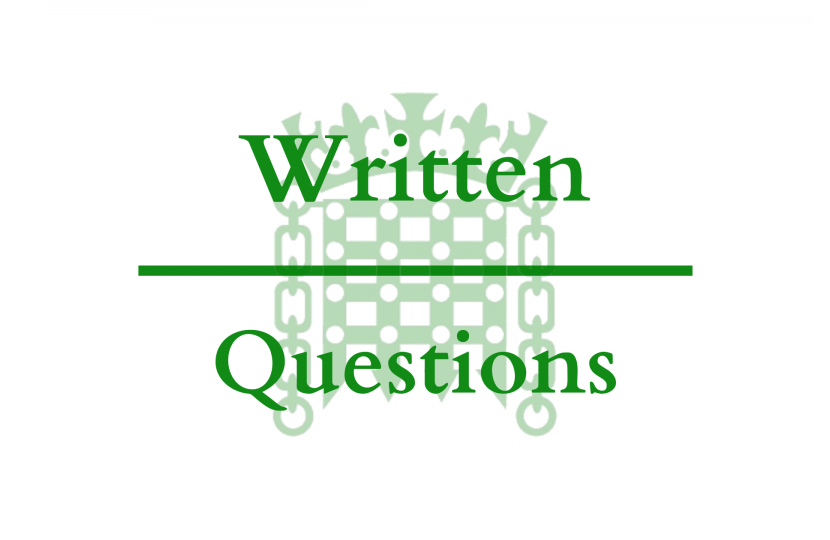
Q: (Andrew Rosindell) To ask the Chancellor of the Exchequer, what assessment he has made of the implications for his policies of reports that HSBC (a) expressed support for the National Security Law imposed by China upon Hong Kong and (b) froze bank accounts of pro-democracy campaigners in Hong Kong, in the context of the announcement of the appointment on 18 January 2021 of HSBC's Group Chairman to the Prime Minister’s Business Council to Build Back Better.
A: (John Glen, Economic Secretary to the Treasury) The Government engages in regular dialogue with businesses in Hong Kong and monitors the operation of the financial sector and its participants on an ongoing basis. Financial institutions operating in Hong Kong do so within a strict legal and regulatory framework.
The Build Back Better Council is being co-chaired by the Prime Minister and the Chancellor. It has 30 members, each appointed to draw together a wide range of leading business expertise from across the British economy, with the aim of working in partnership with government to unlock investment, boost job creation, and level up the whole of the UK.
Q: (Andrew Rosindell) To ask the Secretary of State for Health and Social Care, what steps he is taking to encourage care homes to ease covid-19 restrictions on family visitation over Christmas where possible to do so safely.
A: (Helen Whately, Minister of State for Department of Health and Social Care) Over the Christmas period, visitors in tiers 1-3 were able to continue with indoor visits to their loved ones in care homes, facilitated by the provision of lateral flow testing and continued PPE use. In tier 4, while regular indoor visits were not possible, visits were able to continue in both outdoor settings and indoor where substantial screens were in place.
Q: (Andrew Rosindell) To ask the Secretary of State for Health and Social Care, what assessment his Department has made of the earliest date by which face coverings will no longer be (a) advised or (b) required to be worn in indoor public spaces by his Department.
A: (Jo Churchill, Parliamentary Under-Secretary for Health and Social Care) The Health Protection (Coronavirus, Wearing of Face Coverings in a Relevant Place) (England) Regulations 2020 are set to remain in force until 24 July 2021 and these are kept under constant review. The Regulations also contain a review clause which means they must be reviewed before the end of six months from the date they came into force. This review is due to take place in advance of 24 January and will consider whether the requirements remain necessary and proportionate to protect public health and minimise the spread of COVID-19.
Q: (Andrew Rosindell) To ask the Secretary of State for Health and Social Care, what assessment his Department has made of the effect on the number of reported cases of flu in 2020 of the wearing of face coverings.
A: (Jo Churchill, Parliamentary Under-Secretary for Health and Social Care) Public Health England has made no such assessment.
Q: (Andrew Rosindell) To ask the Secretary of State for Justice, what steps he is taking to ensure that Magistrates courts (a) limit observers and (b) enforce covid-19 lockdown regulations in the context of observing a court hearing not being a legitimate reasons to leave home.
A; (Chris Philp, Parliamentary Under-Secretary of State for the Home Department) Courthouses have been individually assessed, in accordance with guidance approved by Public Health England and Public Health Wales. These assessments include limiting the capacity of waiting areas and courtrooms to enable everyone to observe social distancing requirements.
Magistrates’ courts are under a statutory duty to sit in open court and the public must be admitted, subject to it being safe to do so. It is the responsibility of the police and local authorities to enforce the covid-19 lockdown regulations.
Q: (Andrew Rosindell) To ask the Secretary of State for Health and Social Care, on what date he plans to publish his Department's Mandate to NHS England and NHS Improvement for 2021-22.
A: (Edward Argar, Minister of State for Department of Health and Social Care) The Secretary of State for Health and Social Care has a legal duty to publish the mandate to NHS England by 31 March annually under section 13A of the NHS Act 2006.
Q: (Andrew Rosindell) To ask the Secretary of State for Health and Social Care, whether he has made an assessment of the potential merits of providing additional logistical support to areas with long ambulance waiting times as a result of the covid-19 outbreak.
A: (Edward Argar, Minister of State for Department of Health and Social Care) The provision of additional logistic support is already utilised to assist areas with long ambulance waiting times. Ambulances are diverted and patients redirected to alternative hospitals where clinically appropriate; ambulance staff are used to support hospital handover delays and crews are allowed to handover patients so that they are available to respond to incoming 999 calls.
Support is also provided through mutual aid arrangements with other local providers, coordinated through the National Ambulance Coordination Centre. Each acute trust, with support from the NHS England and NHS Improvement region, regularly makes an assessment as to whether diverts and deflects should be put in place to support hospital capacity. These assessments form part of regular escalation discussions.
Q: (Andrew Rosindell) To ask the Secretary of State for Health and Social Care, what steps he is taking to ensure a sufficient supply of personal protective equipment to frontline paramedics.
A: (Jo Churchill, Parliamentary Under-Secretary for Health and Social Care) Since 25 February 2020, the Department has distributed over seven billion items of personal protective equipment (PPE) for use by frontline workers, including paramedics, in England.
By December 2020, the Department had built a four-month stockpile of all COVID-19 critical PPE, with a tremendous contribution from United Kingdom manufacturers. We are confident in the supply of PPE and that we have appropriate processes and logistics in place to distribute PPE to where it is needed.
Q: (Andrew Rosindell) To ask the Secretary of State for Digital, Culture, Media and Sport, with reference to reports of a further delay to the release of the latest James Bond film, whether he plans further measures to support the cinema industry during the covid-19 outbreak.
A: (Caroline Dinneage, Minister of State for DCMS) The government recognises the significant cultural and economic value of cinemas, and has supported them through both sector-specific and economy-wide measures.
More than 200 independent cinemas have so far received funding of £16 million in the first round of the £1.57 billion Culture Recovery Fund, This funding is being administered by the BFI on behalf of the Department for Digital, Culture, Media and Sport, as part of the biggest ever single investment in this country’s cultural sectors. Grants have been awarded to cinema sites in every corner of the country, with cinemas outside London benefitting from 78% of funding to date. Further to this, we announced in December that cinemas will be able to apply for a share of an additional £14 million in grants as part of the second round of the Culture Recovery Fund. This second round launched on 11 January, and will provide support for cinemas into the next financial year. Cinemas have also been eligible to apply to the second round of Arts Council England’s Repayable Finance scheme, with a total of £100 m available.
Recognising that cinemas need content, during this crisis the Government’s Film and TV Production Restart Scheme has helped keep the cameras rolling at the other end of the screen supply chain. The £500 million scheme, which opened for applications in October 2020, has assured over 100 productions that they will be supported if future losses are incurred due to Covid-19 and provided the confidence they need to restart filming.
In addition, most cinemas have been and are continuing to benefit from economy-wide measures including the VAT cut on tickets and concessions, a business rates holiday, access to Bounce Back Loans, the extended Coronavirus Job Retention Scheme and Local Restrictions Support Grants.
Together these measures are providing a comprehensive package of support to the cinema industry to support it through the pandemic.
Q: (Andrew Rosindell) To ask the Secretary of State for Housing, Communities and Local Government, whether the Waking Watch Relief Fund will fund the cost of infrared CCTV systems for fire detection as well as more standard alarm systems for eligible buildings.
A: (Christopher Pincher, Minister of State for Housing, Communities and Local Government) The Waking Watch Relief Fund is designed to incentivise the installation of a common alarm system in high rise residential buildings with unsafe cladding and reduce the dependency on expensive Waking Watch measures. The Fund will cover the upfront capital costs of installing a common fire alarm system designed in accordance with the recommendations of BS 5839-1 for a Category L5 system, which is referred to in the National Fire Chief Council’s revised guidance on Simultaneous Evacuation.
Q: (Andrew Rosindell) To ask the Secretary of State for Health and Social Care, what plans NHS England and orthodontists are trialing to restore the delivery of orthodontic services during the covid-19 outbreak.
A: (Jo Churchill, Parliamentary Under-Secretary for Health and Social Care) Data on the units of orthodontic activity from 2015-16 to 2019-20 by National Health Service commissioning region is available at the following link:
Data for orthodontic waiting lists is unavailable.
NHS England and NHS Improvement continue to discuss the various approaches to management and restoration of orthodontic services with the profession.




